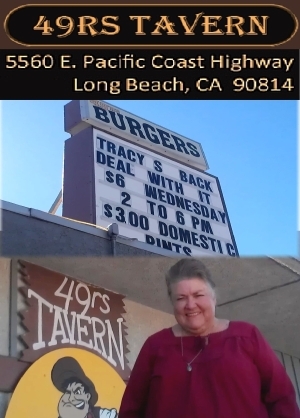The Mayor's chose these individuals for his Task Force:
- Chair Jane Close Conoley, President, California State University, Long Beach.
- Vice Chair Andy Kerr, Board Member, Measure H Citizens' Oversight Advisory.
- John Bishop, President, Memorial Medical Center.
- Tonya Burns, Executive Director, Children Today.
- Carolyn Caldwell, President, St. Mary Medical Center.
- Suny Lay Chang, Chief Operating Officer, LINC Housing.
- Brian D'Andrea, President, Century Villages at Cabrillo.
- Walt Dannenberg, Medical Center Director, Veterans Affairs Long Beach Healthcare System.
- Porter Gilberg, Executive Director, The LGBTQ Center Long Beach.
- Randy Gordon, President, Long Beach Area Chamber of Commerce.
- Thomas Hudson, Resident Commissioner, Housing Authority of the City of Long Beach.
- Jeff Johnson, Chair, Homeless Services Advisory Committee.
- Kraig Kojian, President, Downtown Long Beach Alliance.
- Jeff Levine, Program Director, Long Beach Rescue Mission and Co-Chair Continuum of Care.
- Janet McCarthy, President, Goodwill Southern Los Angeles County.
- Kenneth McDonald, Chief Executive Officer, Long Beach Transit.
- Chris Miller, President, Long Beach Mental Health America.
- Mary Ellen Mitchell, Executive Director, WomenShelter of Long Beach.
- John Molina, Partner, Pacific 6.
- Christine Petit, Executive Director, Long Beach Forward/Building Healthy Communities.
- Jessica Quintana, Executive Director, Centro CHA.
- Erin Rank, President & CEO, Habitat for Humanity of Greater Los Angeles.
- Reagan Romali, Superintendent, Long Beach City College.
- Gregory Sanders, President, Long Beach Ministers Alliance.
- Susana Sngiem, Executive Director, United Cambodian Community.
- Chris Steinhauser, Superintendent, Long Beach Unified School District.
- John Thomas, Chair, The Long Beach Community Investment Company.
- Brenda Threatt, Executive Director, U.S. VETS Long Beach.
- Chris Wing, Chief Executive Officer, SCAN Health Plan.
The group held five meetings during the summer and fall of 2018. The meetings were nominally open to public view but the meetings didn't comply with Brown (open meeting) Act requirements, similar to the Mayor's "Animal Care Visioning Task Force." Both exploit a legal loophole the Mayor used by creating his Task Force's without voted Council action. Informal requests by LBREPORT.com to examine minutes of the group's meetings and hear recordings (if any) of what was said and done were unsuccessful.
The Mayor-chosen group's recommendation include (our description based on the report's text detailed below):
- Centralizing governance control over spending and decisionmaking on homeless-related issues;
- Using public resources to influence public opinion on homeless policies and low-housing (including a "YIMBY" ["yes in my backyard"] campaign);
- "Establish more geographically equitable distribution of lower-income housing units and supportive services across the City" including eliciting "commitments from every Council District to provide for a certain number of affordable and/or supportive housing units/developments, including supportive services, within that City Council district. (These may include new development, re-purposed units, access to units utilizing subsidies, substance use services, mental health services, and other support services)."
- Supporting current City Hall efforts to pursue a "dedicated revenue source" [euphemism for a tax increase or debt bond or other ballot measure(s).]
The report doesn't devote similar attention to increasing public oversight or adding checks and balances on current City spending of millions of dollars for homeless programs while seeking millions more. It basically recommends centralizing power, restructuring the City's "Continuum of Care Board" membership "to serve as a City-wide umbrella governance structure to coordinate the expansion of housing opportunities, homeless services, and homeless response; to develop system performance measures [acountable to whom?]; and ensure system accountability [to whom?] Ensure Board’s membership reflects the cultures in the community and includes members with lived experience." It also recommends creating a new City Hall position "dedicated to positioning the City for future housing funding, addressing zoning and entitlement concerns, and participating with expanded governance structure."
The report arguably conflates (perhaps for political reasons) two complex issues: homelessness and housing. In our view, spending millions to build/subsidize low/very low income housing raises multiple issues separate from spending millions to treat substance-addicted and/or mentally unwell persons, practies that raise their own complex issues.
The group's meeting agendas indicate its primary information source was the City of LB's Dept. of Health and Human Services, which stands to receive increased funding and other resources from some Task Force recommendations.
Mayor Garcia chose individuals for his Task Force who have visible affiliations to groups or entities that could receive increased funding or resources from some Task Force recommendations...but he didn't include individuals or grassroots groups that have sought stronger City enforcement of current laws, and advocacy to change in some state laws, to abate neighborhood crimes attributable to some within LB's homeless population. The resulting report doesn't acknowledge the issue or mention the word "crime" in its text or recommendations.
The issue of a "dedicated revenue source" [which we translate as a ballot measure tax increase, debt bond, or both] has come up before. As previously reported by LBREPORT.com here, on July 24, 2018 (when facing an early Aug. 2018 deadline to put measures on the Nov. 2018 ballot) Councilmembers Richardson, Gonzalez, Austin and Andrews agendized an item to seek management options -- for consideration at the next available Council meeting -- for an unspecified "dedicated local revenue source." During Council discussion, Councilman Richardson, Mayor Garcia, and a number of Councilmembers signaled their openness to a LB tax increase ballot measure of some unspecified type to provide a "dedicated local revenue source"...but not for the November 2018 LB ballot when Garcia sought voter approval for Charter Amendments that included a term limits change.
At the July 24, 2018 Council meeting, Mayor Garcia defensively stated that he and the Council aren't responsible for increasing LB taxes; taxpayers are, he said. "As a reminder, the City doesn't, we don't tax anybody. The taxes that pass the City are voted on by the voters, and so this Council doesn't go and increase someone's tax or do a parcel tax. That is only decided by voters in the city..." [Editor note: Garcia headed the political committee carrying his name that ran a roughly $600,000 campaign for the June 2016 Measure A sales tax increase.]
At the same time, Mayor Garcia stated: "Should this City look and work with the community a local source of to fund more affordable housing? The answer in my opinion is absolutely "yes."...[W]hen you put measures like this in front of a community, you have to bring everybody to the table. You don't pass things without some kind of community conversation that involves all the affected people that are going to be part of this type of campaign that would need to take place."
With his Task Force report, Garcia has just given himself and like minded Councilmembers the policy template for such ballot measures.
The report acknowledges that LB's most recent point-in-time count of LB's homeless population was 1,863 individuals, which the report more than doubles by estimating [no data source cited] that 4,000 people "fall in and out of homelessness in Long Beach each year," Even at that level, it would represent less than 1% of LB's population...for which the Task Force's recommends spending $217,000,000 in capital funds plus $24 million in ongoing "operational" cost. Does that sum sound reasonably proportional to you, or do you think it deserves some taxpayer scrutiny to ensure it's not laden with bureaucratic empire building?
Some of the report's figures and assertions are unsourced (unacceptable for a high school term paper) but portrayed as facts in text and charts. As previously reported by LBREPORT.com, the City Council voted on Dec. 4 to request a city staff report within 60 days on a foundational figure: the number of beds actually available in Long Beach for homeless individuals. The Council did so after LB's Dept. of Health & Human Services couldn't or wouldn't provide that figure some time ago. That leaves unclear whether the "Task Force" did or didn't have that foundational figure at hand when constructed its costly recommendations.
Here are some of the salient recommendations by the Mayor's group in their own words. Are these what you want?
[Task Force report, p. 17]Communications, Education and Advocacy: Communications that educate our communities and partners about homeless services available in Long Beach, how communities can help, as well as build support within communities to accept organizations that provide services to support people experiencing homelessness and low-income housing is essential to reducing stigma related to homelessness and building our City's capacity to end homelessness. Active contributions will be required from all sectors in Long Beach including other City departments, housing developers and policy makers, the Apartment Association, those who have experienced homelessness, businesses, hospitals, education systems, social services, and the general public.
Recommendations:
Implement the City's strategic communications plan, which is currently under development. Engage City partners, community members, businesses, and providers to educate the community about City homeless services and performance and how they can help. Ensure solutions are integrated within the communications. Expedite this plan to address:
- Short term and ongoing needs to de-escalate negative reactions to people experiencing homelessness on the streets of Long Beach.
- Long term issues regarding affordable housing needs and services for people experiencing homelessness.
Reduce stigma and fear surrounding homelessness by:
- Focusing on language and messaging
- Engaging in community education and communication
- Incorporating leading voices in the community
Utilize LA County YES in My Back Yard (YIMBY) education model:
- Use data and stories to build a case for investing in high quality affordable housing in Long Beach. Publicize Long Beach's efforts through a website portal that documents progress, celebrates successes, and mobilizes support.
- Continue and expand City advocacy and education at the County, State and Federal levels to support housing, health and social support legislation and funding.
Funding Current funding opportunities focus on specific homeless services such as outreach, emergency shelter, transitional and rapid rehousing, and services provided for permanent supportive housing. Current funds do not fund capital expenditures to build low-income and homeless housing, nor do they effectively fund homeless prevention services to ensure those who are formerly homeless or precariously housed do not fall into homelessness. The City Council received information on potential funding sources in August 2018 and directed staff to begin exploring possibilities with the community. The City Council allocated a contingent appropriation of $50,000 in the FY19 budget to initiate the work, which will begin in early 2019.
Recommendations
Identify and implement one or more dedicated, sustainable revenue sources to meet governance, data, service, operations and lower-income housing gap financing assistance needs, including dedicated funding resources to support immediate prevention and case management needs.
Capitalize the City's Housing Trust Fund. Local funds are critical to leveraging the resources of other public agencies including the County, State and federal resources such as the Low-Income Housing Tax Credit (LIHTC) as administered by California’s Tax Credit Allocation Committee.
2,000 Low-Income Units $170 [million]
200 Permanent Supportive Housing Units $17 [million]
Purchase of buildings to support shelter opportunities and other programming: $30 [million]
Resource the coordination and oversight of housing and homelessness Citywide, including data infrastructure and support. (Annually) $2 [million]
Prevention, retention, flexible subsidies, 24x7 outreach, and other health and support services. (Annually) $18 [million]
Landlord incentives/Homeless Incentive Program for precariously housed. (Annually) $2 [million]
Emergency Shelter Expansion/Storage Operations. (Annually) $2 [million]
Approximate Total Capital Costs $217 [million]
Approximate Total Operational Costs (on-going) $24 [million]Increase Housing Access
Emergency Shelter: Add 200 beds of shelter/crisis housing capacity by the end of 2020
Permanent Supportive Housing: 200 new additional units of PSH will be entitled, online, or in the pipeline for construction by 2023
Low and Very Low Income Housing: 2,000 very low or low income units will be entitled, online, in the pipeline for construction or completed by 2023.
Short-term
Adopt a progressive inclusionary housing ordinance that creates new affordable housing opportunities throughout the City while requiring payment of reasonable “in lieu” fees by developers.
Provide zoning accommodations to developers who wish to convert existing motels into permanent supportive housing.
Develop and adopt an ordinance that prohibits discrimination based on housing subsidy and other sources of income, including Housing Choice Vouchers (HCV-Section 8) and encourages housing providers to accept tenants with housing subsidies.
Identify properties and incentivize property owners in Long Beach to participate in a shared housing model program that allows for master leasing a property and matching tenants to affordable housing.
Expand the number of rent-stabilized units through options such as production, policy and preservation.
Long-term
Establish more geographically equitable distribution of lower-income housing units and supportive services across the City.
- Elicit commitments from every Council District to provide for a certain number of affordable and/or supportive housing units/developments, including supportive services, within that City Council district. (These may include new development, re-purposed units, access to units utilizing subsidies, substance use services, mental health services, and other support services)...
Provide services and incentives to prevent homelessness.
...Recommendations:
Support and implement tenant assistance policies as developed in coordination with community members and landlords. These include:
- A Tenant Relocation Assistance Policy that provides relocation assistance to households impacted by rising rents and displacement.
- Support to increase the State's noticing requirement for a no-fault termination of tenancy to a minimum of 90 days.
- Rapid rehousing services and deposit assistance, in addition to the tenant relocation assistance policy, for displaced very low-income older adults.
- Setting aside Housing Choice Vouchers for displaced extremely low- and very-low income older adults.
- Establishing a communication framework with HUD, affordable apartment owners with expiring covenants or rental assistance contracts, and residents to improve knowledge of the housing preservation process and to increase housing preservation opportunities.
Provide support services and prevention funding to households at 60 percent (an increase from 40 percent) of average median income (AMI) who are at-risk of losing their housing.
Proactively identify buildings at risk of rent increases and/or evictions. Require owners to notify the City to allow for proactive support of tenants
CONCLUSION
The Everyone Home Long Beach Taskforce asks that the City Council adopt this document outlining our vision, goals and recommendations for addressing housing and homelessness within the City of Long Beach. We look forward to a Long Beach where the experience of homelessness in our City is rare and brief when it occurs. We ask that the City work closely with community members and its community, business, finance, education, health and government partners to implement this aggressive vision-setting document. We understand that achieving this work will require significant dedicated funding and other resources. It is imperative that these resources are identified and prioritized to end homelessness in our City.
So...do you think the Council should adopt these as city policies on Dec. 11 before asking the public if they approve? LBREPORT.com will carry a live videostream on our front page of the City Council's Dec. 11 meeting at which it's scheduled to discuss these recommendations.
Opinions expressed by LBREPORT.com, our contributors and/or our readers are not necessarily those of our advertisers. We welcome our readers' comments/opinions 24/7 via Disqus, Facebook and moderate length letters and longer-form op-ed pieces submitted to us at mail@LBReport.com.
Sponsor | Sponsor |
Sponsor |  |
Sponsor | Sponsor |
 |
| Support really independent news in Long Beach. No one in LBREPORT.com's ownership, reporting or editorial decision-making has ties to incumbent Long Beach officials, development interests, advocacy groups or other special interests; or is seeking or receiving benefits of City development-related decisions; or holds a City Hall appointive position; or has contributed sums to political campaigns for Long Beach incumbents or challengers. LBREPORT.com isn't part of an out of town corporate cluster and no one its ownership, editorial or publishing decisionmaking has been part of the governing board of any City government body or other entity on whose policies we report. LBREPORT.com is reader and advertiser supported. You can help keep really independent news in LB similar to the way people support NPR and PBS stations. We're not |
blog comments powered by Disqus
Recommend LBREPORT.com to your Facebook friends:
Follow LBReport.com with:
RSS |
Contact us: mail@LBReport.com





Hardwood Floor Specialists
Call (562) 422-2800 or (714) 836-7050
